Reishi Benefits (Ganoderma sichuanense)
Reishi (Ganoderma sichuanense) is an edible mushroom and medicinal mushroom.

Neuroprotective Benefits
Reishi has been recognized not only for its broad range of health effects but also for its potential neuroprotective properties. In a comprehensive analysis of mushroom-based dietary supplements available on the Italian market, researchers highlighted the diversity of health benefits attributed to such products including neuroprotection. This study included a detailed assessment of several mushroom extracts, with an emphasis on their composition and potential therapeutic actions. Mushroom-Based Supplements in Italy: Let’s Open Pandora’s Box provides an extensive evaluation of these supplements and sheds light on the importance of standardizing extracts for maximum safety and efficacy.
The neuroprotective benefits of Reishi can be linked to its bioactive compounds that may contribute to the protection and support of nerve cells. These compounds potentially play a role in mitigating neurodegenerative processes, possibly offering support for brain health and cognitive functions. The study mentioned above calls attention to the need for rigorous quality control in Reishi products to ensure consumers receive the full benefits of the mushroom, including its neuroprotective effects. Careful quality assessment and clear labeling are vital to maintain the integrity and therapeutic potential of these supplements.
Learn about mushrooms with neuroprotective benefits.

Supports Gut Health
Incorporating Reishi into one's diet may have a positive impact on gut health. A study dedicated to examining the effects of Ganoderma lingzhi culture on the gut health of broilers demonstrated significant improvements in growth performance, which is partially attributed to enhanced gut microbiota.
The research highlighted that Reishi could reduce the feed conversion ratio and increase the average daily gain in broilers, indicating that it facilitated more efficient nutrient absorption and utilization. Moreover, the presence of Reishi in the broilers' diet led to higher serum superoxide dismutase levels and improved high-density lipoprotein counts, both indicators of stronger antioxidant activity - a key factor in maintaining a healthy gut environment.
Remarkably, the inclusion of Reishi also resulted in an increased production of short-chain fatty acids in the cecal digesta, a vital component in colon health and overall immune function. This aligns closely with the enhanced diversity of gut microbiota and, specifically, the proliferation of beneficial SCFA-related bacteria such as Bacteroidaceae. These probiotic strains are essential for sustaining a balanced gut microbial ecosystem and can contribute to better gut health and metabolism. This research suggests that Reishi may be advantageous in supporting gut functionality and the microbiome.
Learn about mushrooms with gut health benefits.

Supports Metabolic Health
Reishi may play a significant role in supporting metabolic health, as evidenced by studies into its bioactive compounds. Compounds such as exopolysaccharides (EPS) produced by Reishi have shown to positively influence metabolic pathways. A comprehensive genome and transcriptome study on the Ganoderma lucidum strain highlights the metabolism-enhancing properties of these compounds.
The research, specifically determining the effects of Tween80, indicates that this substance boosts EPS production in Reishi. This is crucial as EPS are associated with beneficial effects on metabolic health. Enhanced production, as the study reveals, involves various metabolic processes, including pathways such as the MAPK signaling pathway, metabolism of amino sugars, nucleotide sugars, and the TCA cycle. Such pathways are integral to maintaining healthy metabolic functions.
Moreover, the study showcases that these metabolic benefits might be linked to the upregulation of glycosyltransferases and glycoside hydrolases, which are pivotal enzymes in EPS biosynthesis. Insights from this genome sequencing and transcriptome analysis yield valuable knowledge on the complex metabolic interactions governed by Reishi, paving the way for potential industrial enhancements and more effective use of Reishi in metabolic health applications.
Learn about mushrooms with metabolic benefits.

Supports Cognitive Function
Reishi mushroom is renowned not only for its immune-boosting capabilities but also for its potential to enhance cognitive function. The array of bioactive compounds found in Reishi, such as polysaccharides and triterpenoids, are subjects of interest in the pharmacological community, particularly regarding neuroprotection and mental clarity.
One key review on the chemical constituents and health benefits of Reishi suggests this mushroom may play a role in improving cognitive health. It posits that the active ingredients could be beneficial in treating and enhancing brain function, which is increasingly relevant as societies face the cognitive challenges associated with aging populations.
While the evidence is promising, this work also emphasizes that clinical data to conclusively prove cognitive benefits are limited. Therefore, ongoing research and clinical trials are necessary to establish safe dosages and confirm the cognitive-enhancing capabilities of Reishi that have been observed in laboratory studies.
Learn about mushrooms with cognitive benefits.

Anti-inflammatory Benefits of Reishi
The Reishi mushroom is not only known for its distinctive appearance and history in traditional medicine, but also for its anti-inflammatory properties. Among the bioactive compounds in Reishi, polysaccharides and triterpenoids serve as key agents in moderating inflammation. This mini review highlights the diverse array of health benefits associated with these constituents, including their potential role in reducing inflammation related to several chronic diseases.
Reishi's efficacy in modulating immune responses and suppressing inflammatory pathways extends to its potential as a supportive treatment in cancer therapy. Studies on Ganoderma lucidum have shown promising results in inhibiting the growth of tumors and providing anti-inflammatory support, which may be critical in the management of cancer-associated inflammation.
The comprehensive capabilities of Reishi also relate to its application in hepatoprotection. Liver health, often affected by inflammation, benefits from the myriad mechanisms of action provided by the mushroom's compounds, as outlined in a study focused on hepatoprotective potential. Notably, these studies address the modulation of liver enzymes and free-radical scavenging, both relevant to the mediation of inflammation.
Further supporting the anti-inflammatory benefits of Reishi are insights from prostate cancer cell line treatments, which not only highlight the mushroom's anti-cancer properties but also pinpoint the reduction of inflammatory pathways involved in cancer progression.
Nevertheless, while promising, Reishi must be approached with diligence concerning its use. The mushroom's popularity in dietary supplements calls for an understanding of product quality and efficacy, which is critically assessed in a study examining mushroom-based supplements in Italy. This research illustrates the importance of purity, accuracy of labeling, and the presence of bioactive constituents that contribute to the anti-inflammatory effects.
Research continues to unveil the multifaceted nature of Reishi, yet these findings present a compelling case for its use as a natural anti-inflammatory agent. However, the interplay between its therapeutic potentials and the combination of its bioactive ingredients still demands further clinical investigation to establish standardized dosing and application parameters.
Learn about mushrooms with anti-inflammatory benefits.
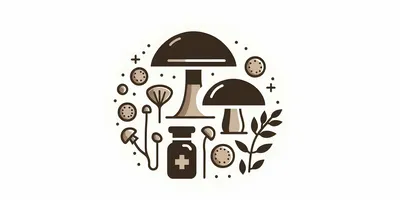
Antioxidant Benefits of Reishi Mushroom
Reishi mushroom is celebrated for its powerful antioxidant properties, which contribute significantly to its health-promoting potential. Antioxidants are crucial for combating oxidative stress, a process that can damage cells and lead to various chronic diseases. The inclusion of Reishi in one's diet can enhance the body's antioxidant activity, as demonstrated by higher levels of serum superoxide dismutase (SOD) and high-density lipoprotein (HDL), essential biomarkers of the body's defense system against oxidative damage [source].
Reishi's antioxidant effects are partly attributed to the triterpenoid compounds that can be efficiently extracted using advanced techniques. These triterpenoids not only exhibit antioxidant activity but also show promise for therapeutic applications, such as improving metabolic syndrome and preventing neuronal damage in neurodegenerative diseases [source]. The effectiveness of these compounds is seen in their ability to bolster cellular antioxidant capacity, which may aid in managing conditions like Alzheimer's disease by inhibiting pathways that lead to neuronal apoptosis [source].
Moreover, the pharmacological activities of Reishi spores, which share the antioxidant benefits of other parts of the mushroom, have been the subject of extensive study. These spores display a range of health-enhancing effects, including improving the body's enzymatic antioxidant defense system and modulation of genes associated with metabolism [source]. Such attributes underline the potential of Reishi mushroom as a natural supplement for boosting the body’s overall antioxidative potential and supporting metabolic health.
The comprehensive composition of Reishi, with its wealth of polysaccharides and triterpenoids, continues to draw attention in the scientific community for their capacity to safeguard against oxidative damage and support overall health. While further research, including clinical studies, is needed to optimize the therapeutic applications of this mushroom, current evidence supports its longstanding reputation as a potent antioxidant [source]. By potentially lowering the risk factors for chronic diseases and enhancing longevity, Reishi maintains its critical role as a functional food and natural remedy in contemporary wellness practices.
Learn about mushrooms with antioxidant benefits.

Antimicrobial Benefits of Reishi
Reishi has a well-documented history in traditional medicine, and its modern implications continue to impress. Particularly, the mushroom's bioactive compounds such as polysaccharides, phenols, and triterpenes contribute significantly to its antimicrobial properties. These substances play an essential role in the prevention and suppression of pathogen spread, making Reishi an effective natural ally against microbial infections.
The research on Ganoderma's therapeutic qualities indicates that the mushroom's complex array of compounds can inhibit the growth of various bacteria, viruses, and fungi, providing a complementary approach to traditional antimicrobial treatments.
In addition to therapeutic uses, the importance of pure, contaminant-free Reishi supplements cannot be overstressed, as highlighted by a study focusing on mushroom-based dietary supplements in Italy. It reinforces the value of stringent quality control to maximize the health benefits of Reishi, including its antimicrobial action. When considering Reishi supplements, it's crucial to ensure they are sourced from reputable suppliers to avoid the introduction of harmful elements, like aflatoxins, which underscores the potential of Reishi when processed correctly and safely.
Learn about mushrooms with antimicrobial benefits.

Antiviral Properties of Reishi
Reishi, with its rich history in traditional Chinese medicine, is renowned for a multitude of health benefits. Among the most compelling is its antiviral potential. The mushroom contains over 400 bioactive compounds, notably polysaccharides and triterpenoids, which have been recognized for their ability to combat viruses. Studies highlight its efficacy in this regard, as well as immunomodulatory and anti-inflammatory activities that contribute to its protective effects.
Research into the effect of polypore mushroom mycelia, which includes Reishi, has demonstrated a significant reduction in virus levels within honey bees. In particular, extracts from Reishi considerably decreased levels of deformed wing virus (DWV) and Lake Sinai virus (LSV), showcasing its promise as a natural substance to enhance the health of honey bee populations vital for ecological balance. This investigation supports the potential application of Reishi extracts to combat viral threats more broadly.
In addition to these findings, Reishi has been recognized for its hepatoprotective capabilities, with studies documenting an array of mechanisms including antiviral actions that safeguard liver health. The mushroom's bioactive compounds play a role in modulating liver enzymes and providing immunomodulatory activity, which is essential in resisting viral infections that may affect the liver. These hepatoprotective properties are further explained in a dedicated research paper, underlining the mushroom's versatility in health protection.
Understanding Reishi's nutritional profile is key in adopting it as a functional food or nutraceutical supplement, especially for its antiviral advantages. With comprehensive research confirming its antioxidant, anticancer, and antiviral properties, Reishi continues to gain widespread attention in the fields of pharmacology and nutraceuticals. However, it is important to note that further investigation is needed to fully ascertain the safety and optimal usage of this powerful mushroom.
Learn about mushrooms with antiviral benefits.
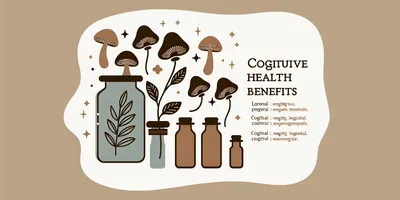
Supports Cognitive Function
Cognitive decline is a significant concern associated with aging and neurodegenerative diseases like Alzheimer's. An exciting avenue of research has revealed that Reishi mushroom, with its bioactive compounds, may offer protective benefits for the brain. Specifically, Ganoderma lucidum triterpenoids (GLTs), a group of compounds found in Reishi, have been studied for their potential to enhance cognitive function.
One study, in particular, has shed light on the cognitive benefits of Reishi. The research titled "Ganoderma lucidum Triterpenoids (GLTs) Reduce Neuronal Apoptosis via Inhibition of ROCK Signal Pathway in APP/PS1 Transgenic Alzheimer's Disease Mice," explored the effects of these compounds on mice genetically modified to exhibit Alzheimer's-like symptoms. The results were promising, showing that GLTs could reduce cognitive impairment. They achieved this by inhibiting neuronal apoptosis—a process where neurons begin to degenerate and die, which is a key factor in cognitive decline associated with Alzheimer's disease.
The research uncovered that GLTs mitigate this neuronal loss by modulating the Rho-associated protein kinase (ROCK) signaling pathway. This pathway is crucial for maintaining neuronal health and is involved in various neural processes that are essential for memory and learning. Furthermore, the antioxidant properties of GLTs were observed to provide additional protective effects on the neurons of the hippocampus—the brain region heavily implicated in memory formation and cognition.
While these findings are groundbreaking, the authors of the study stress the need for further research and clinical trials to fully understand the therapeutic potential of Reishi for Alzheimer's and cognitive health in general. However, the research offers hope that Reishi could one day be part of a strategy to support cognitive function and combat neurodegenerative diseases.
Learn about mushrooms with cognition benefits.

Anticancer Benefits of Reishi Mushroom
Reishi mushroom has been an integral component of traditional medicine, noted for its remarkable anticancer properties. The bioactive compounds such as polysaccharides, peptidoglycans, and triterpenes, which are fundamental constituents of Reishi, have demonstrated anticancer potential in various studies. These components have been extensively researched, reflecting a promising future for the integration of Reishi in pharmacological and nutraceutical applications aimed at cancer prevention and treatment.
The complex biochemistry of Reishi mushroom houses a variety of substances that contribute to its medicinal potentials. Among them, the immunomodulatory effects play a crucial role in anticancer activity, enhancing the body's innate ability to fight malignant cells. The in-depth analysis of Reishi's phytochemistry reveals that these natural compounds exert a synergistic effect that might inhibit cancer progression and even potentially reverse tumor growth.
However, the effectiveness of Reishi in anticancer therapy is not only reliant on its bioactive components but also on the quality and purity of the mushroom extract used. Recent research scrutinizing mushroom-based supplements in Italy raises awareness about discrepancies found in labeling versus actual content, including potential contaminants that can affect the efficacy and safety of these products. This underscores the importance of stringent quality controls and standardized extracts to truly harness Reishi's anticancer benefits while ensuring consumer safety.
Learn about mushrooms with anticancer benefits.
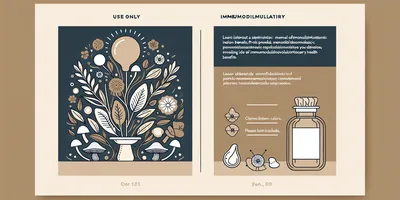
Immunomodulatory Benefits of Reishi
Reishi mushroom, known for its therapeutic versatility, contains several components that engage the body's immune system. Notable among these are the polysaccharides and triterpenoids, which have been found to exhibit immunomodulatory activities. These substances actively help in fine-tuning the immune response, either by enhancing its action against pathogens or by downregulating it to prevent excessive inflammation.
The unique chemical compounds in Reishi, such as proteins and essential minerals, also contribute to its immunomodulatory effects. This modulation plays a significant role in disease treatment, helping the body to maintain a delicate balance required for fighting off a variety of diseases, from hypertension to cancer. The mushroom's benefits touch on improving the body's defensive mechanisms, including stimulating white blood cell function which is integral in warding off infections and diseases.
Despite the promising attributes of Reishi, the importance of conducting in-depth research is emphasized for a clearer understanding of its full potential in clinical applications. Further studies are suggested to refine knowledge regarding the optimal use and dosage for maximal health benefits.
Learn about mushrooms with immunomodulatory benefits.

Supports Healthy Blood Sugar Levels
Reishi mushroom has been acknowledged for its potential antidiabetic properties among its diverse health benefits. A comprehensive analysis of mushroom-based dietary supplements in Italy highlighted the significance of Reishi in managing blood sugar. The research pinpointed not only the antidiabetic effects but also the broader spectrum of therapeutic actions, including lipid-lowering and antimicrobial activities.
Through molecular and biochemical analyses of various supplements, the study provided insights into the importance of quality in these health products. Moreover, while some supplements did not accurately reflect their labeled content, properly sourced and standardized Reishi supplements have been suggested to positively influence blood sugar regulation. This could be particularly beneficial for those managing diabetes or seeking to maintain healthy glucose levels.
For those interested, the detailed findings of the study "Mushroom-Based Supplements in Italy: Let’s Open Pandora’s Box" emphasize the antidiabetic potential of Reishi alongside a call for stringent quality control to ensure the safety and beneficial impact of these supplements.
Learn about mushrooms with antidiabetic benefits.
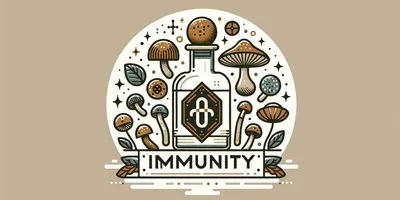
Supports Immune Function
The Reishi mushroom is renowned for its ability to bolster the immune system through its rich composition of bioactive compounds. One of the key components responsible for this is a group of triterpenoids found in Reishi spores. These triterpenoids are particularly effective in supporting immunity due to their modulating and adaptogenic effects.
Research conducted by Shen et al. (2020) utilized an advanced ultrasound-assisted extraction technique to isolate these triterpenoids from Reishi spore powder. The study highlighted that the extracted compounds not only have promising roles in enhancing glucose consumption in insulin-resistant cells, indicating potential antidiabetic benefits, but they also demonstrated noteworthy antioxidant properties. Most importantly, the triterpenoid extracts showcased an ability to support immune health, which stands as a testament to Reishi’s immunomodulatory capacity. These findings solidify the standing of Reishi mushroom as a natural adjunct for promoting robust immune defenses.
Shen et al.'s findings support the notion that incorporating Reishi mushroom into one's diet or supplement regimen may yield significant immune benefits. The advanced extraction techniques not only improve the efficacy of the Reishi components but also ensure a stronger and well-regulated immune response, keeping the body's defense mechanisms in optimal condition.
Learn about mushrooms with Immunity benefits.

Non-toxic Benefits of Reishi
Reishi has a long-standing reputation in traditional medicine for being both potent and non-toxic. A controlled human supplementation study aimed to evaluate these claims through scientific means. In this double-blinded, placebo-controlled, cross-over intervention trial, eighteen healthy adults were enrolled and given either a commercial Reishi preparation or a placebo over the course of 4 weeks.
The comprehensive analysis focused on a plethora of biomarkers that measure antioxidant status, coronary heart disease risk, DNA damage, immune status, inflammation, and possible liver and renal toxicity. The findings of the study laid the groundwork for Reishi’s safety profile as there were no significant changes in the biomarkers indicative of liver, renal, or DNA toxicity. There was, however, a suggestion of decreased lipid levels and increased urinary antioxidant capacity, hinting at Reishi’s potential for promoting heart health and oxidative balance without toxic side-effects.
This research provides reassurance for those considering Reishi supplements as part of their wellness routine, highlighting its non-toxic nature even at supplemental dosages. It thus supports the safe inclusion of Reishi in diets for those seeking its various health benefits, aligning with its historical use in promoting healthy aging.
Learn about mushrooms with Non-toxic benefits.

Supports Blood Sugar Regulation
Reishi mushroom has been identified as a powerful adjunct in the management of blood sugar levels. A comprehensive analysis of its chemical constituents emphasized the presence of hypoglycemic agents, which can be beneficial for those managing diabetes or at risk of developing the condition. The polysaccharides found in Reishi mushroom have shown promise in their capability to lower blood glucose levels, making it a valuable natural supplement for blood sugar regulation.
In addition to its direct hypoglycemic activity, Reishi mushroom's antioxidant properties also play a role in supporting the management of diabetes. Through combating oxidative stress — a key contributor to insulin resistance — Reishi can aid in improving glucose metabolism and overall glycemic control. Its adjunctive use in diabetes treatment is a testament to its medicinal versatility, as acknowledged in several traditional medicine systems. For details regarding the hypoglycemic benefits of Reishi mushroom and its role in disease treatment, explore a comprehensive mini-review that discusses a range of potential health applications.
While these findings are compelling, further clinical research is suggested to fully understand the appropriate dosages and long-term effects of Reishi mushroom in the context of diabetes management. Nonetheless, the existing evidence supports the inclusion of Reishi as a complementary treatment for those seeking natural means to regulate their blood sugar levels and enhance their overall well-being.
Learn about mushrooms with Hypoglycemic benefits.

Anti-cancer Benefits
Reishi mushroom, with its diverse array of bioactive compounds, has been recognized for its potential as an inhibitor of cancerous cells. The mushroom is rich in substances such as polysaccharides, triterpenoids, and peptides known to possess anti-cancer properties.
One important facet of Reishi's anti-cancer benefits is its immune system modulation capability. It aids in the enhancement of immune responses which are vital in the body's defense against cancer. The mushroom has been found to improve tumor response when used alongside conventional treatments such as chemo or radiotherapy.
Studies also show that certain extracts from Reishi can influence gene expression pathways that are essential in cancer treatment, including cell cycle control and apoptosis. For instance, different Ganoderma extracts have been evaluated against human prostate cancer cell lines, demonstrating a capability to inhibit cancer cell growth.
Beyond direct anti-cancer activity, Reishi mushrooms also contain B-glucans, which have been studied for their immunomodulating properties and may directly suppress tumor growth and invasiveness. This suggests that Reishi could be an effective component of complementary medicine in treating illnesses such as breast cancer.
Moreover, the use of advanced extraction techniques like ultrasound-assisted extraction has shown promise in retrieving higher yields of the beneficial triterpenoids from Reishi spores, potentially offering a more potent anti-cancer effect and improving metabolic health.
Given these promising findings, Reishi mushroom stands out as a complementary agent in the fight against cancer, with studies showing minimal side effects such as nausea and insomnia but no significant toxicity. Nonetheless, further clinical trials are needed to conclusively determine its efficacy in cancer therapy and its impact on long-term survival.
Learn about mushrooms with Anti-cancer benefits.
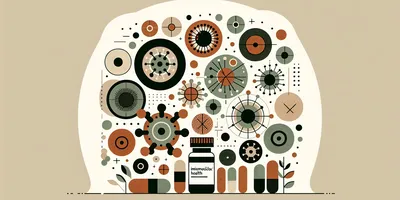
Immunomodulatory Effects of Reishi
Reishi mushrooms, revered in traditional Asian medicine, contain a wide array of bioactive compounds such as polysaccharides and triterpenoids. Notably, these compounds exert significant immunomodulatory effects, which enhance the body's immune defense mechanisms. These immunological responses include both the activation and suppression of specific components of the immune system to maintain a balanced immune state, which is crucial for overall health and disease prevention.
Research highlights that Reishi can influence the production and activity of key immune cells. For instance, the polysaccharide compounds in Reishi are known to modulate the function of lymphocytes, which play a vital role in the body's adaptive immune response to pathogens and cancerous cells. Additionally, these compounds help in regulating inflammation, an immune response that, when chronic, can lead to numerous diseases and illnesses.
Beyond its immune-enhancing properties, Reishi mushrooms have exhibited potential in directly inhibiting tumor growth and inducing apoptosis in cancer cells. This anti-cancer action seems to be synergistic with its immunomodulatory abilities, potentially making Reishi a valuable adjunct in cancer therapy. Despite these promising leads, further clinical studies are necessary to establish standardized dosing and to fully understand the therapeutic scope of Reishi in immune health.
Learn about mushrooms with Immunomodulator benefits.

Antitumor Benefits of Reishi Mushroom
The Reishi mushroom is renowned for its potential in combatting tumors, a property that differentiates it as an important functional food in traditional medicine. An assortment of chemical compounds inherent to Reishi, including triterpenoids and polysaccharides, are attributed with anti-tumor activities that have been observed in both laboratory and clinical studies.
Remarkably, Reishi shows efficacy against various forms of cancer by inhibiting the proliferation of cancer cells and triggering apoptosis – the process of programmed cell death. This therapeutic mushroom has been a subject of extensive research, revealing promising results particularly against colorectal, prostate, breast, and ovarian cancers. Its immunomodulatory and antiangiogenic properties further enhance its reputation as an anti-cancer agent by potentially preventing the formation of new blood vessels that tumors require to grow.
Additionally, Reishi polysaccharides play a significant role as immunomodulators, aiding in the fine-tuning of the immune system to better target and eliminate malignancies. Despite the extensive folklore and promising scientific evidence, the therapeutic effectiveness and optimal dosage of Reishi still necessitate further research for precision in clinical applications and long-term health benefits.
Learn about mushrooms with antitumor benefits.

Hepatoprotective Benefits of Reishi
Reishi is renowned not only for its potential in boosting the immune system but also for its liver-protecting capabilities. The active compounds found in Reishi, such as triterpenoids and polysaccharides, have been reported to exert significant hepatoprotective effects. These substances help to safeguard the liver, an essential organ for detoxification and metabolism, from various types of damage.
In particular, research outlines that these compounds can be effective in preventing liver injuries by maintaining proper liver function, promoting regeneration of liver cells, and protecting the liver from toxic substances. For instance, individuals who take Reishi may benefit from its ability to reduce the impact of harmful substances, potentially due to its antioxidant properties, which combat oxidative stress within the liver. These properties have been backed by various studies confirming the liver protective benefits of Reishi.
While clinical evidence continues to grow, these findings suggest promising implications for Reishi's role in liver health. Such protective effects may be critical for those with compromised liver function or for those seeking to maintain healthy liver function as a preventative measure. Given the complexity of liver diseases, Reishi's multifaceted hepatoprotective actions offer a complementary approach to traditional liver treatments and underline the importance of further research in this area.
Learn about mushrooms with hepatoprotective benefits.

Supports Cardiovascular Health
Reishi has been traditionally recognized for its potential in supporting cardiovascular health, including its antihypertensive properties. One of the key components behind these benefits is the mushroom's array of bioactive compounds, including triterpenoids and polysaccharides, which have been found to harmonize blood pressure levels and reinforce the circulatory system. Health Benefits of Ganoderma lucidum as a Medicinal Mushroom provides a comprehensive review of these health-promoting attributes.
The antihypertensive effect of Reishi is noteworthy; it suggests that the mushroom can be used to manage high blood pressure, a common risk factor for heart diseases. The aforementioned review elaborates on clinical trials and research that support the use of Reishi in various forms such as syrups and tablets, which can contribute to a balanced cardiovascular regimen.
However, the efficacy and safety of Reishi supplements are contingent on their composition and quality. The study Mushroom-Based Supplements in Italy: Let's Open Pandora's Box sheds light on the critical need for accurate labeling, adherence to genetic purity, and absence of contaminants in mushroom-based products. Its findings underscore the importance of standardized extracts and stringent quality control to maximize the potential health benefits and minimize risks, especially when considering antihypertensive and other systemic effects.
Learn about mushrooms with antihypertensive benefits.

Hypocholesterolemic Benefits
Reishi mushroom, known for its rich composition of bioactive compounds, has been studied for its potential to reduce cholesterol levels, a property known as hypocholesterolemic effect. The presence of triterpenoids, polysaccharides, and other constituents in Reishi contribute to its ability to combat high cholesterol. This effect is important as managing cholesterol levels is critical for preventing heart disease and maintaining overall cardiovascular health.
Various studies have explored the cholesterol-lowering properties of Reishi. For instance, these bioactive components have demonstrated an ability to influence lipid metabolism and reduce blood cholesterol levels, thus offering a natural therapeutic approach for managing hypercholesterolemia. By potentially inhibiting cholesterol synthesis and promoting its excretion, Reishi can play a significant role in cardiovascular health maintenance.
While research is promising regarding Reishi's hypocholesterolemic effects, the review also emphasizes the importance of further clinical trials to standardize therapeutic components and assure consistent quality in its use. Nonetheless, the growing international market for Reishi-based products, such as syrups and tablets, highlights the medicinal mushroom's potential in supporting cholesterol health, among its other diverse health benefits.
Learn about mushrooms with hypocholesterolemic benefits.

Antihistaminic Benefits of Reishi
The Reishi mushroom is not only celebrated for its immunomodulatory properties but also for its remarkable antihistaminic effects. These effects make it a potential natural remedy for those battling with allergies. The bioactive compounds within Reishi, including triterpenoids and polysaccharides, contribute to its ability to modulate the immune response and alleviate allergic reactions.
One notable study titled "Health Benefits of Ganoderma lucidum as a Medicinal Mushroom", highlights the diverse pharmacological activities of these compounds found in Reishi. Specifically, the antihistaminic effects may offer relief to those suffering from allergy-induced discomfort by mitigating the release or action of histamines, which are responsible for common allergy symptoms such as sneezing, itching, and inflammation.
While the research looks promising, it is important to note that the current evidence is based on the pharmacological activities observed in studies. The paper emphasizes the necessity for standardization and deeper investigation into Reishi's active components to ensure consistent therapeutic quality and effectiveness in future allergy treatments.
Learn about mushrooms with antihistaminic benefits.

Anti-Angiogenic Properties
Reishi mushroom has garnered attention for its potential in preventing angiogenesis, which is the formation of new blood vessels. This process is crucial for tumor growth and metastasis, and therefore, the antiangiogenic compounds found in Reishi have significant implications for cancer treatment. Research highlights that the active components such as triterpenoids and polysaccharides within Reishi can exert these antiangiogenic effects, thus inhibiting the vascularization that supplies nutrients and oxygen to cancerous cells.
These substances could potentially disrupt the angiogenic signaling pathways, impairing the growth and spread of tumors. The exciting prospect of Reishi mushroom as part of cancer therapy emphasizes the importance of further clinical trials to unravel the full potential and therapeutic application of its antiangiogenic properties.
Learn about mushrooms with antiangiogenic benefits.

Supports Metabolic Function
Reishi mushroom has been recognized for its ability to support metabolism, vital for overall health and well-being. An integral part of this process can be attributed to bioactive triterpenoids found within the mushroom. These unique compounds have shown a variety of health benefits, including metabolic enhancement.
Recent research identified a key component in the biosynthesis of these triterpenoids. The study, titled "Identification of a Novel Metabolic Target for Bioactive Triterpenoids Biosynthesis in Ganoderma lucidum," found a novel transcription factor, GlbHLH5, which plays a crucial role in regulating the production of triterpenoids in Reishi. Researchers demonstrated that by manipulating the levels of GlbHLH5, it was possible to significantly enhance or decrease the biosynthesis of these bioactive triterpenoids.
The findings suggest that GlbHLH5 is a positive regulator and that its activation, for instance by methyl jasmonate (MeJA), could serve as a novel metabolic target to boost the production of triterpenoids in Reishi mushrooms. As these triterpenoids are linked to metabolic benefits, understanding and potentially controlling their biosynthesis is a promising approach for enhancing the metabolism-supporting properties of Reishi mushroom.
Learn about mushrooms with Metabolism benefits.

Anti-diabetes Benefits
Reishi mushroom, revered for its therapeutic properties, has been shown to hold potential in the management of diabetes. The bioactive compounds present, including polysaccharides and triterpenoids, may offer a natural adjunct therapy for diabetes treatment. A comprehensive mini-review on the chemical constituents and therapeutic activities of Reishi has compiled evidence supporting its application in diabetes management among various other diseases.
These compounds have been observed to aid in the regulation of blood glucose levels, an essential aspect of diabetes care. The presence of essential nutrients such as proteins and essential metals further contributes to the overall health benefits of Reishi. Although further clinical research is warranted to establish concrete therapeutic protocols, the accumulation of laboratory studies suggests a positive role of Reishi in supporting diabetes treatment.
Given the complex nature of diabetes, which requires a multifaceted treatment approach, the potential for Reishi to act as a natural therapeutic agent is promising. This underscores the necessity of advancing research to delineate the specific pathways through which Reishi exerts its anti-diabetic effects, and to establish safe and effective dosages for clinical use.
Learn about mushrooms with Anti-diabetes benefits.

Antiallergenic Properties
Reishi mushroom is renowned not only for its longevity-boosting effects but also for its remarkable antiallergenic benefits. The mushroom holds a diversity of bioactive compounds such as polysaccharides and triterpenoids, which contribute to its potential to counteract allergic reactions.
The antiallergenic effect of Reishi is tied to its ability to modulate the immune system, thereby inhibiting certain immune responses that lead to allergic reactions. This mushroom has demonstrated in various studies its capacity to prevent the release of histamines, which are chemicals in the body that trigger symptoms of allergies, such as sneezing, itching, and watery eyes.
Further, Reishi's triterpenoids have shown to possess anti-inflammatory properties, which can help soothe allergic reactions, reducing discomfort and promoting ease of symptoms in those suffering from allergy-related conditions. The integration of Reishi into one's diet may offer a complementary approach to managing and potentially reducing the impact of allergies.
Learn about mushrooms with antiallergenic benefits.

Supports Antithrombotic Activity
Reishi mushroom is known for its broad spectrum of medicinal benefits, including its antithrombotic properties. The potential of Reishi to prevent the formation of blood clots—a process known as thrombosis—is particularly noteworthy. Thrombosis can lead to life-threatening conditions such as stroke and heart attack, highlighting the importance of natural preventative measures.
One of the key findings regarding Reishi's benefits in preventing thrombosis is attributed to its myriad bioactive compounds. The mushroom's polysaccharides and triterpenoids have been found to play a role in inhibiting platelet aggregation, which is a crucial step in clot formation. By interfering with this process, Reishi may help to maintain healthy blood circulation and prevent the complications associated with thrombosis.
Furthermore, the comprehensive review of Reishi’s therapeutic activities offers insight into its antitumor, immunomodulatory, and anti-inflammatory effects, which can indirectly influence its antithrombotic capabilities. As inflammation is known to contribute to thrombotic risks, Reishi's anti-inflammatory properties might also be contributing to its ability to reduce clot formation.
Although clinical studies on Reishi's antithrombotic effects are not yet conclusive, the current evidence supporting its use in traditional medicine, combined with its known platelet-inhibitory activities, makes it a promising candidate for further investigation in the prevention of thrombotic conditions.
It's important to note that while Reishi is generally considered safe, it should be used with caution, especially prior to surgical procedures due to its potential to affect blood clotting mechanisms. As always, consulting with a healthcare provider before starting any new supplementation is advised, particularly for those on anticoagulant medications or with clotting disorders.
Learn about mushrooms with antithrombotic benefits.

Antibacterial Properties
Reishi is revered not only for its immune-modulating impact but also for its antibacterial properties. With the presence of over 400 bioactive compounds like polysaccharides and triterpenoids, Reishi has been recognized for its antibacterial potential, which contributes to its overall medicinal repertoire.
These compounds actively inhibit the proliferation of various bacterial strains, thereby bolstering the body's innate defenses against harmful bacteria. Research on Reishi's effects confirms that its application spans beyond merely maintaining immune health to actively participating in the body's antibacterial responses.
In addition to its well-known anti-tumor and immunomodulating effects, the ability of Reishi to impede bacterial growth is a testament to its versatility as a traditional medicine. Its use in treatments against resistant bacterial infections situates Reishi as a potential adjunct to conventional antibacterial therapies, being a natural agent with fewer side effects.
Learn about mushrooms with antibacterial benefits.
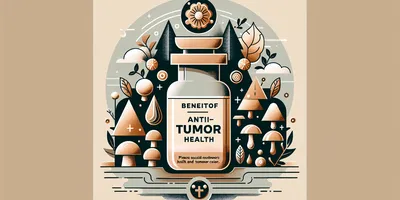
Anti-tumor Benefits
Reishi mushroom exhibits remarkable anti-tumor properties, as demonstrated by various studies. These effects are largely attributed to bioactive compounds within the mushroom such as polysaccharides and ganoderic acids.
Research has shown that Reishi spore extracts inhibit the proliferation of cancer cells and may also affect genes related to metabolism. This indicates potential applications not only for cancer therapy but also for metabolic diseases.
One specific study highlights that a polysaccharide peptide isolated from Reishi, named GL-PP, can significantly reduce the growth of human glioma U251 cells by inducing cell cycle arrest and apoptosis. The induction of apoptosis was linked to an increase in caspase-3 activity, an enzyme crucial for the execution-phase of cell apoptosis. These findings suggest that GL-PP could be a natural candidate for glioma treatment.
Moreover, extracts from Reishi have been found to suppress cell proliferation and induce stress response pathways in ovarian cancer cells. In a study on the human ovarian cancer cell line OVCAR-3, Reishi's active compounds triggered antioxidant responses that could support chemopreventive strategies.
Importantly, Reishi not only exerts direct anti-cancer effects but may also enhance the sensitivity of cancer cells to chemotherapy. This dual action was observed in epithelial ovarian cancer cells, where Reishi reduced cell numbers and colony formation, and worked synergistically with the chemotherapeutic agent cisplatin. The mushroom's compounds promoted apoptosis and inhibited anti-apoptotic proteins, suggesting that Reishi mushroom could be an effective adjunct to chemotherapy in ovarian cancer treatment.
The collective research underscores the potential of Reishi as a valuable agent in cancer management, capable of targeting various aspects of tumor development and response to therapy.
Learn about mushrooms with Anti-tumor benefits.

Immunomodulation Benefits of Reishi
Reishi mushroom is renowned not only for its therapeutic applications but particularly for its capacity to modulate the immune system. Immunomodulation refers to the process by which the immune system is regulated to either enhance or suppress its activity, ensuring a balanced immune response. A systematic review consolidating evidence from 90 studies has highlighted the immunomodulatory effects of Reishi spores, showcasing their potential in anti-tumor, anti-inflammatory, and antioxidant activities.
Notably, β-glucans, potent polysaccharides found in Reishi, play a crucial role as immunomodulators. These compounds are known to stimulate the immune response, which may reduce inflammation and could directly suppress the growth and invasiveness of tumors, as suggested by the research on β-glucans from Reishi in breast cancer treatment. This indicates that Reishi could be employed as a form of complementary medicine alongside conventional cancer therapies.
Furthermore, the bioactive compounds present in Reishi, including phenols and triterpenes, are responsible for its broad spectrum of medicinal potentials. According to a comprehensive review on the phytochemistry of Ganoderma species, these substances contribute significantly to the mushroom's capacity to enhance the immune response. The interactions between these compounds and the immune system could potentially lead to the development of new treatments for various diseases, due to their therapeutic properties.
Research underscores that while Reishi shows great promise in modulating the immune system, further clinical studies are necessary to fully understand its role and safety in treatment protocols. Nonetheless, by harmonizing the immune system's activity, Reishi may offer a critical natural adjunct to health management and disease prevention strategies.
Learn about mushrooms with Immunomodulation benefits.

Supports Metabolic Health
Reishi is not only renowned for its immune-boosting properties but also for its potential in supporting metabolic health. Research into the spores of Reishi has uncovered that they contain compounds which may positively affect metabolic pathways, indicating possible benefits in managing metabolic diseases.
In a comprehensive systematic review, evidence from numerous studies has highlighted that the spores house a range of bioactive properties including antioxidant effects, which are critical in maintaining metabolic equilibrium. These antioxidant effects are particularly important as they help neutralize free radicals and reduce oxidative stress, factors that are associated with metabolic dysfunction.
Moreover, the review suggests that treatments involving Reishi spore extracts influence genes that are integral to our metabolic processes. This genetic influence could pave the way for new avenues in treating and potentially preventing metabolic diseases. While these findings are promising, it is important to note that safety considerations should be taken into account, especially for those with specific health conditions.
Learn about mushrooms with Metabolic benefit benefits.

Supports Liver Health
Reishi mushroom has garnered attention for its hepatoprotective properties, primarily derived from its rich compositions of bioactive compounds such as polysaccharides and triterpenoids. These natural substances are shown to contribute to the overall health and function of the liver. By modulating liver enzymes, scavenging free radicals, and exerting antifibrotic and antiviral effects, Reishi demonstrates a broad spectrum of defensive actions against liver disorders.
Further research has delved into the capabilities of triterpenoid compounds extracted from Reishi using advanced techniques such as ultrasound-assisted extraction (UAE). The study by Shen et al. (2020) revealed that UAE could effectively produce triterpenoids that exhibit potential benefits for type 2 diabetes and have significant antioxidant activity—a promising boon for liver health. This optimized extraction method not only enhances the yield of valuable triterpenoids but also ensures their bioavailability for therapeutic use.
Given the vital role that liver health plays in overall well-being, the hepatoprotective potential of Reishi is particularly compelling. It offers a novel insight into the mechanisms of action for liver protection, suggesting its use as a functional food or supplement with immune-modulating and hepatocellular homeostasis maintenance capabilities. Such traits underscore its potential alongside conventional medicine in managing chronic liver diseases.
Learn about mushrooms with Liver health benefits.

Aids in Diabetes Management
The Reishi mushroom is known for its potential benefits in diabetes care, particularly due to its triterpenoid compounds. A study conducted by Shen et al. (2020) explored the efficacy of ultrasound-assisted extraction (UAE) in isolating these triterpenoids from Ganoderma lucidum spore powder. This optimized technique not only proved to be more efficient compared to conventional methods but also revealed that these triterpenoid extracts significantly enhanced glucose consumption in insulin-resistant HepG2 cells. This suggests a promising role for Reishi in managing type 2 diabetes.
The extraction process optimized through this study highlighted that the triterpenoids obtained had a substantial effect on glucose metabolism, a key factor in diabetes care. In addition to their impact on glucose levels, the extracts also demonstrated noteworthy antioxidant properties and excellent biocompatibility, underlining the mushroom's potential as a natural adjunct therapy for those managing diabetes.
By incorporating these triterpenoid compounds into a dietary routine as supplements, individuals may experience a natural and alternative approach in the effort to regulate blood sugar levels and support overall health. The implications of this research are significant, as they offer a new perspective on the traditional use of Reishi mushroom in natural medicine and its application in modern health practices targeting diabetes.
Learn about mushrooms with Diabetes care benefits.

Supports Apoptosis in Cancer Cells
Research on Reishi mushroom has revealed significant anti-proliferative and pro-apoptotic effects on cancer cells. For instance, a study on human glioma U251 cells demonstrated that a polysaccharide peptide from Reishi significantly inhibited cell proliferation and promoted apoptosis. The induction of apoptosis is a key mechanism through which anticancer therapies like Reishi can help eliminate cancer cells, thereby inhibiting or slowing down tumor growth.
Another study underscores the anti-tumor effects of Reishi on ovarian cancer cells, illustrating that not only does Reishi reduce the viability and proliferation of these cells, it also enhances their sensitivity to conventional chemotherapy treatments. By promoting cell cycle arrest and apoptosis, and reducing the expression of anti-apoptotic proteins, Reishi presents a multi-faceted approach to cancer therapy, potentially improving outcomes for those undergoing treatment.
Such findings are crucial as they suggest that Reishi could serve as an adjuvant therapy, improving the efficacy of existing cancer treatments and offering a natural, plant-based option to support traditional cancer care strategies.
Learn about mushrooms with pro-apoptotic benefits.

Supports Detoxification
Reishi mushrooms are recognized for their ability to promote the body's detoxification processes. This is partly due to their natural composition, which includes polysaccharides and ganoderic acids. The study titled Suppression of proliferation and oxidative stress by extracts of Ganoderma lucidum in the ovarian cancer cell line OVCAR-3 demonstrates that extracts from Reishi can induce the expression of detoxification enzymes through the activation of the Nrf2 signaling pathway. This signaling is essential for the regulation of antioxidant proteins that protect against oxidative damage. Importantly, the research highlights that Reishi extract has the potential to inhibit cell proliferation and stimulate the body's detoxification mechanisms, offering chemopreventive benefits.
In a related study on environmental detoxification, Reishi was employed in a novel biodecolorization system for azo dyes, which are ubiquitous pollutants with significant health and ecological ramifications. The study titled Efficient Azo Dye Biodecolorization System Using Lignin-Co-Cultured White-Rot Fungus by Sun et al., finds that the presence of alkali lignin significantly enhanced the capability of Reishi to remove harmful azo dyes from the environment. The study confirmed that this impressive effect was due to biodegradation rather than mere physical adsorption, with Reishi and alkali lignin jointly working to break down the dye and subsequently boosting the activity of laccase enzymes known for their role in degradation. The findings shed light on the power of Reishi to assist in in-depth biological detoxification, making it not only beneficial for personal health but also for environmental remediation.
Learn about mushrooms with Detoxification benefits.

Antioxidative Benefits
Reishi mushrooms have been associated with impressive antioxidative effects. A study focusing on ovarian cancer cells (OVCAR-3) explored the potential anti-tumor benefits of Reishi and its ability to suppress proliferation and oxidative stress. Researchers found that extracts from Reishi, rich in polysaccharides and triterpenes known as ganoderic acids, could inhibit cancer cell growth.
Crucially, Reishi extracts were observed to stimulate the expression of antioxidative and detoxification enzymes through the nuclear factor erythroid 2-related factor 2 (Nrf2) signaling pathway. This is particularly significant as Nrf2 is a key protein that regulates the expression of antioxidant proteins that protect against oxidative damage triggered by injury and inflammation.
The findings also highlighted that ethanol extracts of Reishi displayed more potent effects compared to aqueous extracts in terms of inhibiting cell proliferation and inducing the production of detoxification enzymes. This suggests the potential of Reishi as a chemopreventive agent, which could be used alongside chemotherapy to enhance its effectiveness and provide robust antioxidative support.
Learn about mushrooms with Antioxidative benefits.

Boosts Immune Function in Cancer Therapy
Reishi mushroom, admired for its potential to improve immune health, particularly within the context of cancer therapy, shows promise when used in conjunction with conventional treatments. In a systematic review and meta-analysis, analysis of five randomized controlled trials involving 373 participants revealed that Reishi might enhance tumor response when administered alongside chemotherapy or radiotherapy.
This healthful fungus is reported to support host immune functions, with evidence pointing to an increase in T-lymphocyte co-receptor subsets. Such an immune boost can be crucial for patients undergoing cancer treatments, which often weaken the immune system. Furthermore, studies suggest that patients consuming Reishi experienced an improved quality of life, compared to control groups, which underscores the ancillary benefits Reishi can provide during the arduous journey of cancer therapy.
With minimal reported side effects, such as nausea and insomnia, and no significant toxicity, Reishi presents as a potential complementary option in cancer care. However, due to the current limitations in research, particularly concerning long-term survival impacts, it is not yet recommended as a primary cancer treatment. Thus, Reishi remains a supportive, not standalone, player in the immune-enhancing arsenal for cancer patients.
Learn about mushrooms with immune boost benefits.

Well-Tolerated Adjunct in Cancer Therapy
Reishi mushroom has been traditionally used for its health-promoting properties, and modern research continues to explore its potential benefits, especially for individuals with cancer. A systematic review and meta-analysis assessed its effectiveness when used alongside conventional treatments such as chemo or radiotherapy. The analysis, which included five randomized controlled trials with 373 participants, demonstrated that Reishi mushroom might enhance tumor response within these conventional settings.
The same review revealed a notable improvement in host immune functions, such as an increase in T-lymphocyte co-receptor subsets, which suggests the mushroom's role in immune modulation. Furthermore, cancer patients using Reishi mushroom in conjunction with standard therapy reported a better quality of life than those who did not. This is significant, as maintaining quality of life is a crucial aspect of cancer treatment.
Importantly, the use of Reishi mushroom has been associated with minimal side effects, with only minor incidents such as nausea and insomnia, and no significant toxicity was reported. These findings underscore the mushroom's reputation as a well-tolerated adjunctive treatment in cancer therapy. However, the review advises that Reishi should not be used as a primary treatment for cancer, emphasizing the need for continued research to delineate its potential in improving long-term survival outcomes.
Learn about mushrooms with well-tolerated benefits.

Antifibrotic Benefits
Reishi has been recognized for its potential in preventing and treating liver fibrosis, a condition characterized by excessive accumulation of extracellular matrix proteins that can lead to cirrhosis. Research indicates that the bioactive compounds in Reishi, particularly polysaccharides and triterpenoids, exhibit remarkable antifibrotic actions, helping to preserve the liver's structural integrity and function.
These compounds have been found to exert hepatoprotective effects by modulating liver enzymes, scavenging free radicals, and providing immunomodulatory activity. Furthermore, Reishi aids in regulating the production of nitric oxide and maintaining hepatocellular calcium homeostasis, which are critical processes in curtailing the progression of liver fibrosis.
The implementation of Reishi as a functional food, nutraceutical supplement, or in conjunction with conventional medicine offers a promising complementary approach for managing chronic liver diseases, where antifibrotic action is profoundly beneficial.
Learn about mushrooms with Antifibrotic benefits.

Glucose Modulation Benefits
Reishi mushroom has been studied for its potential in glucose regulation, which is a crucial aspect for managing diabetes and its complications. A research study has shown that Reishi can play a significant role in modulating glucose levels in gestational diabetes mellitus (GDM), a condition that can lead to serious health issues for both the mother and the fetus during pregnancy.
In this particular study, pregnant rats with streptozotocin-induced GDM were supplemented with Reishi mushroom extract. The results were promising, demonstrating that Reishi reduced the glycemic response and also decreased the activities of liver enzymes such as ALT and AST, which are indicative of improved hepatic metabolism.
Moreover, Reishi supplementation was associated with a reduction in lipid peroxidation—an indication of oxidative stress reduction—which is particularly beneficial in diabetes management. Additionally, the increase in catalase activity observed in the study indicates an enhancement in the antioxidant defense system, thereby offering a protective effect against oxidative stress-related damage.
Significantly, apart from assisting in glucose modulation, the study also highlighted that Reishi could have potential benefits for fetal development, suggesting a protective role for the developing fetus in the context of GDM. Thus, the use of Reishi mushroom could be an adjunctive strategy for managing glucose levels and reducing the risk of diabetes-related complications.
Learn about mushrooms with Glucose modulation benefits.

Liver Protection Benefits
Reishi mushrooms are renowned for their potential in safeguarding liver health. One study has indicated the impressive capacity of Reishi to modulate glucose levels and lipid peroxidation in the liver, notably in the context of gestational diabetes mellitus (GDM). This condition not only affects pregnant individuals but also poses severe health risks to the fetus.
In this pivotal research, the administration of Reishi was observed to mitigate the glycemic response and curb the activities of liver enzymes such as alanine aminotransferase (ALT) and aspartate aminotransferase (AST), which are crucial indicators of liver health. High levels of these enzymes typically signify liver injury or stress, thus their reduction signals a protective effect by Reishi. Furthermore, the study reported that Reishi elevated catalase activity, an antioxidant enzyme that plays a key role in neutralizing oxidative stress within the liver cells. This study showcases the mushroom's capability to not only protect maternal liver function during GDM but also to potentially safeguard fetal development through its antioxidant and glucose-regulating effects.
The broader implication extends to non-pregnant individuals as well, suggesting that Reishi could be a natural ally in managing liver health, particularly in cases where oxidative stress and impaired glucose metabolism are of concern. As liver health is central to overall well-being, the protective effects of Reishi could contribute significantly to the maintenance and restoration of liver function.
Learn about mushrooms with Liver protection benefits.

Reduces Oxidative Stress
Reishi mushroom, with its wealth of bioactive compounds, has been the subject of research for its potential in oxidative stress reduction. Ganoderma lucidum Modulates Glucose, Lipid Peroxidation and Hepatic Metabolism in Streptozotocin-Induced Diabetic Pregnant Rats is a pivotal study that examines the impact of Reishi on gestational diabetes mellitus (GDM), a condition which poses health risks for both mother and fetus. In this research, Reishi was administered to pregnant rats, revealing a notable decrease in lipid peroxidation — a key indicator of oxidative damage.
The study indicates that Reishi effectively lowered the glycemic response and enhanced catalase activity, which is crucial in detoxifying harmful reactive oxygen species (ROS). By decreasing activities of liver enzymes like ALT and AST, Reishi helps to maintain liver health and systemic balance in the presence of oxidatively stressful conditions such as GDM.
In addition to mitigating oxidative stress markers, Reishi showed promising effects in protecting the development of the fetus, underscoring its potential role in supporting both maternal and fetal health in challenging conditions. This research underscores the powerful antioxidative properties of Reishi mushroom, suggesting its therapeutic potential for conditions characterized by elevated oxidative stress.
Learn about mushrooms with Oxidative stress reduction benefits.

Fetal Protection Benefits
Reishi, known for its health-promoting compounds, shows promising benefits in protecting fetal health, particularly in the context of gestational diabetes mellitus (GDM). GDM poses a significant risk for both expectant mothers and their unborn children, potentially leading to adverse health outcomes.
A notable study titled Ganoderma lucidum Modulates Glucose, Lipid Peroxidation and Hepatic Metabolism in Streptozotocin-Induced Diabetic Pregnant Rats delved into the capacities of Reishi to influence maternal-fetal outcomes during GDM. The research employed a model where pregnant rats were administered Reishi (100 mg/kg/day) and subsequently induced with GDM. The treatment period extended both before and after GDM induction, offering a comprehensive window to assess the effects of Reishi on the condition.
The findings of the study are quite remarkable. Reishi supplementation was observed to effectively reduce the glycemic response, lowering the occurrence of high blood sugar levels that are characteristic of GDM. Moreover, there was a corresponding decrease in the activities of liver enzymes ALT and AST, indicating a potential reduction in hepatic stress. Notably, there was also a reduction in lipid peroxidation levels alongside an increase in catalase activity, a clear sign of diminished oxidative stress.
Perhaps its most profound implication is the evident protective effects that Reishi had on fetal development. By modulating glucose metabolism and reducing oxidative damage, Reishi may contribute to healthier fetal growth and development, curbing the risks associated with GDM. This research suggests that Reishi possesses therapeutic properties that could be beneficial in supporting fetal health during complicated pregnancies.
Although these findings are based on animal studies, they highlight the possible protective roles that Reishi could play in human pregnancies affected by diabetes, offering a natural adjunct treatment option. It signals the need for further research to explore and validate Reishi's benefits in human maternal-fetal medicine.
Learn about mushrooms with Fetal protection benefits.

Acts as a Chemosensitizer in Cancer Treatment
Reishi has been recognized for its potential as a supplementary therapeutic in cancer treatment, particularly for its ability to act as a chemosensitizer. Research on epithelial ovarian cancer cells has shown that Reishi can significantly diminish cell proliferation, hinder colony formation, and restrict cell migration and spheroid formation in a dose-dependent manner. This finding includes effects on both chemosensitive and chemoresistant cells.
In terms of enhancing conventional chemotherapy, the study suggests that Reishi can boost the efficacy of cisplatin, a commonly used chemotherapy drug. By inducing cell cycle arrest at the G2/M phase and promoting apoptosis, Reishi increases p53 levels and decreases Akt expression. This process is crucial as it leads to the activation of caspase 3 and suppresses anti-apoptotic proteins such as Bcl-2 and Bcl-xL. With its multi-faceted anti-tumor properties, Reishi emerges as a promising adjunct in the treatment against ovarian cancer, potentially improving responses to chemotherapy and offering hope for better clinical outcomes.
Learn about mushrooms with Chemosensitizer benefits.
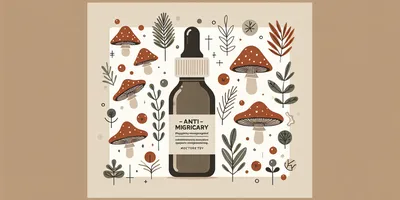
Anti-migratory Benefits in Cancer Treatment
The Reishi mushroom has shown promising anti-tumor and anti-migratory effects, especially in the context of ovarian cancer. One study has demonstrated that Reishi can significantly inhibit the migration of epithelial ovarian cancer (EOC) cells. This is particularly crucial as cell migration is a key step in cancer metastasis, wherein cancer cells spread from an initial site to different parts of the body.
Further, the study reveals that Reishi not only inhibits cell migration but also reduces colony formation and spheroid formation within these cells. Its impact is observed across a range of EOC cell lines, including those resistant to chemotherapy. The addition of Reishi to the chemotherapy drug cisplatin substantially increased the cancer cells' sensitivity, suggesting that Reishi mushroom could potentiate the effects of conventional chemotherapy.
This effect is believed to occur through the induction of cell cycle arrest at the G2/M phase, promotion of apoptosis—which is the process of programmed cell death—by increasing p53 expression, and decreasing the level of the protein Akt which is often involved in cell survival pathways. The Reishi mushroom's role in activating caspase 3, and concurrently inhibiting anti-apoptotic proteins like Bcl-2 and Bcl-xL, underscores its potential as a complementary therapy in cancer treatment.
Learn about mushrooms with Anti-migratory benefits.

Cell Cycle Regulator Benefits
Reishi mushroom has been shown to possess potent anti-tumor properties, and recent research underscores its potential in regulating the cell cycle of cancer cells. A study investigating the impact of Reishi on epithelial ovarian cancer (EOC) revealed that it could effectively diminish cell proliferation and impede the ability of EOC cells to form colonies, migrate, and develop spheroids, which is indicative of its potential to suppress tumor growth.
The compound exerts a pronounced synergistic effect when used in conjunction with chemotherapy drugs, such as cisplatin. This is of particular interest as it suggests that Reishi mushroom may enhance the efficacy of conventional chemotherapeutic agents, marking an important step in cancer management and therapy. Importantly, the study indicates that Reishi causes EOC cells to arrest in the G2/M phase of the cell cycle, which is a critical control point where damaged cells can be repaired before division, or lead to apoptosis if irreparable.
The anti-cancer effects of Reishi mushroom are further characterized by its ability to regulate the expression of key proteins involved in cell cycle and apoptosis. It was noted that Reishi increases the expression of p53, a key tumor suppressor protein, while decreasing Akt expression, which is often associated with cancer progression. Additionally, the activation of caspase 3 and suppression of anti-apoptotic proteins such as Bcl-2 and Bcl-xL by Reishi contribute to its apoptosis-inducing effects, offering multiple avenues through which it exerts its anti-tumor action on ovarian cancer cells.
Learn about mushrooms with Cell cycle regulator benefits.

Antiaging Properties
Reishi mushrooms have garnered attention for their potent antiaging properties. The bioactive compounds such as polysaccharides, phenols, and triterpenes found in these mushrooms are key contributors to their longevity benefits. These substances work in tandem to protect cells from the oxidative damage that accelerates aging.
Studies suggest that Reishi mushrooms enhance the body's defense mechanisms against age-related conditions. For instance, polysaccharides in Reishi have been observed to improve the antioxidant status of organisms, which is vital in mitigating damage caused by free radicals. This antioxidant capability is particularly beneficial in preventing cellular damage, one of the primary drivers of the aging process.
Additionally, the phenolic compounds in Reishi are recognized for their anti-inflammatory effects, which play a significant role in slowing down the aging process. Chronic inflammation is known to accelerate the deterioration of tissues and organs, leading to various age-associated diseases. By curbing inflammation, Reishi mushrooms help maintain the integrity and functionality of bodily systems as one ages.
Furthermore, the triterpenes found in Reishi mushrooms not only add to the mushroom's anti-inflammatory effects but also have been associated with improving longevity. Research indicates that they may enhance immune function and promote detoxification processes, which are crucial in maintaining the body's health and vitality over the years.
The compound interest of these protective effects contributes to the overall antiaging potential of Reishi mushrooms, making it a natural choice for those seeking to promote longevity and healthy aging. For a deeper understanding of Reishi's medicinal potential and its antiaging effects, refer to the comprehensive review on the Phytochemistry of Ganoderma Species.
Learn about mushrooms with antiaging benefits.

Nutritional Value of Reishi Mushroom
Reishi mushroom is well-regarded not only for its therapeutic properties but also for its impressive nutritional profile. Enriching foods with Reishi can significantly enhance their protein, fat, and carbohydrate content, along with crucial fatty acids such as alpha-linolenic and linoleic acids. This was exemplified in studies where yogurt was infused with β-glucans from Reishi, resulting in a nourishing food product that boasted not only a richer nutritional composition but also maintained a pleasing taste according to sensory evaluations.
Moreover, the addition of Reishi's β-glucans to yogurt has shown a remarkable increase in angiotensin-converting enzyme–inhibitory activity. This presents promising health implications, suggesting that Reishi-enriched products could contribute to cardiovascular health by potentially lowering blood pressure. Despite a slight compromise in the gel structure of the yogurt, the enhanced nutritional benefits and maintained sensory acceptance highlight the mushroom's versatility as an ingredient in health-focused food innovations.
Learn about mushrooms with Nutritional value benefits.

Reishi Mushroom's Role in Enriching Nutritional Value
Reishi mushrooms are known for their health-promoting properties, and recent research has looked into their potential as a functional food ingredient. A study that incorporated β-glucans from Reishi mushroom into yogurt found that such enrichment could significantly enhance the nutritional profile of the yogurt. The fortification led to an increase in protein, fat, carbohydrates, alpha-linolenic acid, and linoleic acids, crucial components for maintaining good health.
Moreover, while the addition of these β-glucans from Reishi resulted in a weaker gel structure of the yogurt, it had no negative impact on the product's sensory acceptance. In fact, participants indicated a high level of sensory approval for the enriched product. This suggests that incorporating Reishi's compounds into everyday food items can be a palatable way to boost their nutritional value. Importantly, the yogurt enriched with Reishi mushroom's β-glucans demonstrated a significant increase in angiotensin-converting enzyme–inhibitory activity, highlighting its potential benefits in promoting cardiovascular health.
These findings illuminate the multifaceted benefits that Reishi can bring to food products, potentially playing a role in the development of health-enhancing functional foods. For more on the positive implications of incorporating Reishi into enriching yogurts, review the full study here.
Learn about mushrooms with Health benefits benefits.

Tumor Response Benefits
One of the remarkable health benefits associated with Reishi mushroom is its potential to aid in tumor response, especially when used alongside conventional cancer therapies. A comprehensive Cochrane review evaluated the effects of Reishi mushroom in cancer treatment, examining its efficacy as a complementary therapy. The review highlighted that when Reishi is used in conjunction with chemotherapy or radiotherapy, it may enhance tumor responsiveness to these treatments.
Furthermore, the studies reviewed suggest that Reishi mushroom could have a role in boosting specific immune functions. It has properties that support the immune system in recognizing and combating tumor cells. This indicates a promising step forward in integrative cancer care, pointing to the mushroom's potential in improving the efficacy of standard cancer treatments.
Importantly, patients who added Reishi to their cancer treatment regimen reported an improved quality of life. Considering the challenging side effects often associated with cancer treatments, the ability of Reishi to provide supportive care and improve patient wellbeing is noteworthy. The studies suggest only minor side effects, with no significant toxicity reported, highlighting its safety profile when used as a complementary treatment.
However, it is crucial to acknowledge that while these findings are encouraging, there is still a need for further comprehensive research to fully understand the long-term survival benefits and to establish Reishi mushroom as a certified treatment in cancer care. Thus, it is not yet recommended as a primary treatment modality for cancer, but rather as a supportive adjunct to existing therapies.
Learn about mushrooms with Tumor response benefits.

Immune Support Benefits of Reishi Mushroom
Reishi mushroom, known for its health-promoting properties, also plays a significant role in supporting the immune system. One study, which analyzed the gene expression profiles of prostate cancer cell lines after treatment with various Reishi mushroom extracts, highlighted its impact on immune responses. The results suggested that Reishi could modulate gene expression pathways that bolster the immune system's ability to counteract cancer cell growth.
The active compounds in Reishi mushroom extracts were found to have significant influences on cell cycle control and apoptosis, which are essential processes for both normal immune function and the suppression of tumor growth. These findings indicate that Reishi mushroom may enhance the body's inherent immune mechanisms, making it a valuable complement to traditional cancer treatments.
Concerns pertaining to the safety and efficacy of Traditional Chinese Medicines, where Reishi mushroom has been a staple, have been addressed by studies such as the one referenced in a paper discussing the efficacy and safety of Chinese herbal medicines. The cited research meticulously evaluated the influence of Reishi mushroom on inflammatory and immune biomarkers, as well as its safety profile, providing evidence that Reishi could contribute to reducing risk factors for coronary heart disease without causing hepatic or renal toxicity.
The accumulated research on Reishi mushroom presents it as not only safe for consumption but also potentially beneficial in modulating the immune system. These practices underscore the mushroom's long-standing use in Asian cultures for health promotion and disease prevention, further cementing its position in herbal medicine around the world.
Learn about mushrooms with Immune support benefits.

Anti-tumor Benefits
Reishi mushroom is recognized for its potential anti-tumor attributes. Traditionally used in various Eastern medicinal practices, Reishi has been the focus of scientific scrutiny to validate its reputed health benefits, including its cancer-fighting properties.
One of the most compelling areas of research has been the examination of Reishi's impact on tumorigenesis. In the clinical sphere, the mushroom has been noted for its ability to support the body's innate cancer-fighting mechanisms. This involves the modulation of the immune system, which can lead to an increased ability to combat the development and spread of tumors.
The intriguing properties of Reishi encompass its potential to suppress inflammation and enhance immune function. Immune cells play a crucial role in identifying and attacking cancer cells. Research into the efficacy and safety of Chinese herbal medicines, including Reishi, has underscored the crucial need for rigorous research. One study highlighted by this body of work particularly examined Reishi's effects on biomarkers related to inflammatory and immune health, with findings that suggested a lowered risk profile for coronary heart disease, a common comorbidity with cancer, without exhibiting toxicity to the liver or kidneys.
While the research community continues to explore the intricacies of Reishi's medicinal properties, it is undeniable that this mushroom shows promise as a natural adjunct in the ongoing fight against cancer. Further studies are essential to fully comprehend its role within the global antioxidant system and its potential for incorporating into mainstream healthcare regimens. The study on the biological and beneficial effects of G. lucidum underscores the necessity for continued empirical research in this field.
Learn about mushrooms with anti-tumour benefits.

Supports Better Sleep and Relaxes the Nervous System
Reishi is revered not only for its immune-boosting properties but also for its potential to soothe the mind and support better sleep. The calming effects of Reishi are attributed to its ability to modulate the body's response to stress and anxiety, which can often interfere with sleep.
A comprehensive review of Traditional Chinese Medicines, including Reishi, underscored its long-standing use in Far Eastern healthcare systems to promote health and treat diseases. While there is ongoing debate regarding the safety and efficacy of Chinese herbal medicines in the Western context, controlled studies, such as the one conducted by Wachtel-Galor et al., have started to build a foundation of scientific understanding regarding the sedative benefits of Reishi. This research recognizes the potential of Reishi to help in reducing risk factors for coronary heart disease, which is often exacerbated by stress and poor sleep, although changes in plasma lipids were not statistically significant in their findings.
Furthermore, the study reported no evidence of hepatic, renal toxicity, or genotoxicity, reinforcing the safety of Reishi when used as a sedative. Nonetheless, the importance of more rigorous and objective scientific research has been highlighted to confirm the benefits and therapeutic mechanisms of Reishi, ensuring its integration into sleep health support regimens is based on solid evidence.
Learn about mushrooms with sedative benefits.
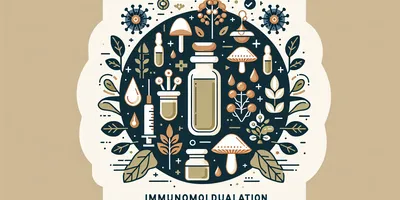
Immunomodulating Effects of Reishi Mushroom
Reishi mushroom is known for its remarkable immunomodulating properties, which enable it to enhance and regulate the body's immune response. Immunomodulators are agents that can modulate the immune system, either by stimulating a weak system to fight pathogens or by suppressing an overactive system to prevent damage to the host's own cells. Reishi's immunomodulating effects can be attributed to its bioactive compounds, such as polysaccharides, triterpenoids, and peptidoglycans.
Studies, such as the one assessing the quality and health benefits of Reishi mushroom-based supplements, highlight its potential in supporting various aspects of human health. Through molecular and biochemical analyses, this particular research underscores the importance of Reishi's components in offering lipid-lowering, antihypertensive, and antidiabetic effects alongside its capacity to bolster the immune function.
Moreover, this particular research emphasizes the role of Reishi in combating inflammation, which is a common underlying factor in many chronic illnesses. By modulating the immune response, Reishi shows potential in contributing to therapies against conditions with inflammatory components, including allergies and certain types of cancers. In this context, enhancing the immune health is not only about defending against pathogens but also about calibrating the body's internal responses to prevent and mitigate various diseases.
Caution is advised as the study also found discrepancies in labeling and potential contaminants in some Reishi supplements. This highlights the necessity for consumers to seek high-quality, contaminant-free products from reputable sources to ensure the beneficial effects of Reishi are obtained reliably and safely.
Learn about mushrooms with Immunomodulating benefits.

Lipid-lowering Benefits
Reishi mushroom is not only celebrated for its immune-modulating properties but also for its potential lipid-lowering effects. A study titled "Mushroom-Based Supplements in Italy: Let’s Open Pandora’s Box" delved into a variety of health implications tied to the consumption of mushroom-based dietary supplements, including their role in cholesterol management. The research highlighted the lipid-lowering potential among the various health benefits of these supplements.
The Italian market offers a diverse array of mushroom-based products that claim to provide numerous health advantages, from antihypertensive and antidiabetic effects to lipid-lowering benefits. However, this study serves as an eye-opener, demonstrating a compelling need for tighter controls and more stringent quality assurance practices in the production of these supplements. Investigations into 19 samples from different brands revealed inconsistencies between the labeling and the actual content, which in some instances included contaminants like aflatoxins, known for their toxicity, and fluctuating levels of heavy metals.
Despite these concerns, the study also shone a light on the genuine health-promoting constituents found within these products, such as ergosterol, a precursor to vitamin D in fungi, and essential glucans known to aid in cholesterol reduction. It is the presence of these compounds that underscores the lipid-lowering benefits of Reishi mushroom, provided the products are pure, accurately labeled, and free of harmful substances. Ensuring the quality of Reishi supplements is imperative for consumers looking to leverage its cholesterol-managing potential safely.
Learn about mushrooms with Lipid-lowering benefits.

Alleviates Allergic Reactions
Reishi mushroom is recognized not only for its general health benefits but also for its specific action against allergic reactions. Its antiallergic properties stem from the ability to help modulate the immune system, thus providing relief from common allergies. Allergies are often the result of an overreaction of the immune system to certain environmental substances, and compounds found in Reishi can help balance this immune response.
According to a comprehensive analysis titled "Mushroom-Based Supplements in Italy: Let’s Open Pandora’s Box," there’s evidence supporting the antiallergic benefits of Reishi alongside other health-enhancing effects. The research delves into a variety of mushroom supplements available on the Italian market, describing a spectrum of potential benefits that extends to the areas of lipid regulation, blood pressure moderation, sugar level stabilization, antimicrobials, and, crucially, allergy mitigation. Moreover, the paper outlines the necessity for rigorous quality assessments to ensure the safety and effectiveness of mushroom supplements, especially considering the variance in composition and the presence of contaminants found in some products.
Consumers and healthcare professionals alike should pay close attention to product sourcing and quality assurance to enjoy the antiallergic benefits of Reishi without exposure to undesirable substances. For more information on the meticulous evaluation of these supplements and the implications for health and safety, explore the findings of the study in detail here.
Learn about mushrooms with Antiallergic benefits.

Inhibits Fat Cell Formation
One of the remarkable benefits of Reishi is its ability to combat obesity by preventing the formation of new fat cells. A study on ReishiMax, a supplement made from Reishi mushroom, reveals significant findings in this area. The research demonstrated that ReishiMax has the potential to inhibit the differentiation of pre-adipocytes into adipocytes, the process by which new fat cells are formed.
During adipogenesis, certain key transcription factors such as PPAR-gamma, SREBP-1c, and C/EBP-alpha are crucial for the maturation of fat cells. The study showed that ReishiMax effectively suppresses the expression of these transcription factors, thereby reducing the likelihood of fat cell formation. Furthermore, genes associated with lipid synthesis, transport, and storage were also downregulated, indicating a reduced capacity for fat storage within the body.
In addition to these actions, ReishiMax seemed to activate AMP-activated protein kinase (AMPK), which plays a pivotal role in cellular energy homeostasis. AMPK activation led to an enhancement in glucose uptake by adipocytes, an effect typically observed with insulin. Through these mechanisms, Reishi may hold promise as a natural intervention for managing obesity and related metabolic disorders like type 2 diabetes.
Learn about mushrooms with Inhibits fat cell formation benefits.

Enhances Glucose Uptake
The metabolism-enhancing properties of Reishi mushroom include a notable impact on glucose uptake, a key factor in managing blood sugar levels and addressing conditions like type 2 diabetes. A significant study on ReishiMax, a dietary supplement made from this mushroom, has provided evidence of these benefits.
ReishiMax has been observed to inhibit the differentiation of pre-adipocytes into adipocytes, effectively impeding the normal process whereby fat cells mature and accumulate lipid droplets. By suppressing genes involved in fat cell creation and function, Reishi demonstrates the potential to prevent excessive fat storage.
Even more impressive is how Reishi activates AMP-activated protein kinase (AMPK), an enzyme that plays a crucial role in cellular energy homeostasis. The activation of AMPK by ReishiMax parallels insulin's function in stimulating glucose uptake in cells, which helps in lowering blood glucose levels and could be immensely beneficial for those managing type 2 diabetes.
Through these mechanisms, Reishi mushroom emerges as an agent with significant promise for managing obesity and improving metabolic health, helping to sustain energy balance and healthy blood sugar levels.
Learn about mushrooms with Enhances glucose uptake benefits.

Activates AMPK
Reishi is gaining attention not only for its immune-enhancing effects but also for its role in metabolic health. One of the notable mechanisms is its ability to activate AMP-activated protein kinase (AMPK), an enzyme that acts as a metabolic master switch regulating several intracellular systems, including the cellular uptake of glucose. This activation is pivotal for energy balance and has a profound impact on both obesity and type 2 diabetes management.
Research indicates that components found in Reishi can inhibit the development of adipocytes, the cells responsible for fat storage. In a studied supplement called ReishiMax, extracts of the mushroom have shown to suppress the expression of transcription factors that are key in the process of adipogenesis — the formation of fat cells. This could potentially reduce the accumulation of fat in the body.
Additionally, the same study found that Reishi notably stimulates glucose uptake by the cells. Comparable in some ways to insulin, this signifies Reishi's potential to support healthy blood sugar levels and enhance cellular energy production. Consequently, Reishi presents a compelling case for managing metabolic disorders through natural means.
Learn about mushrooms with Activates AMPK benefits.